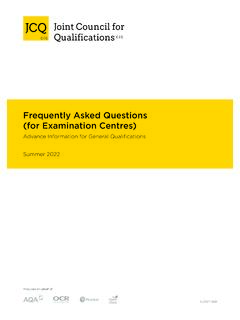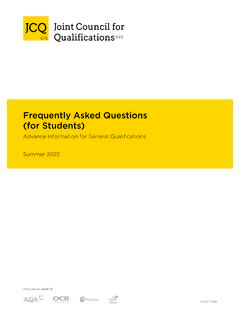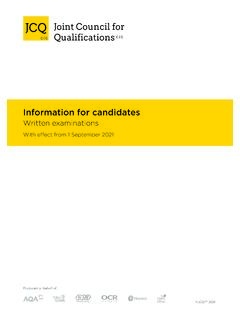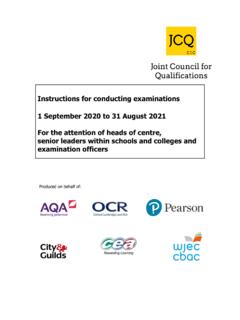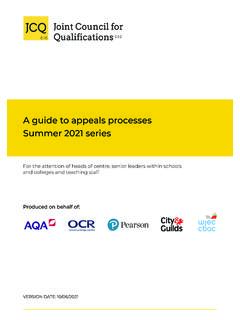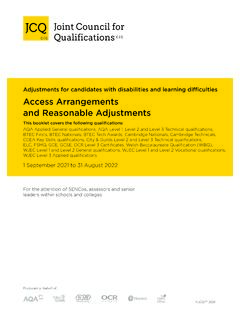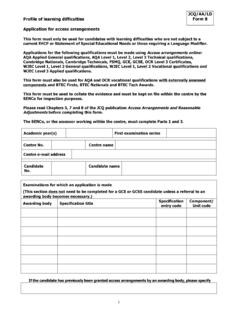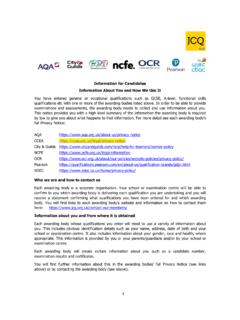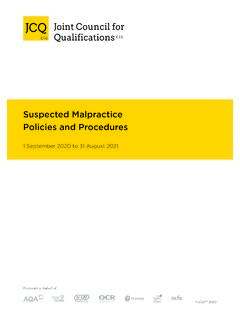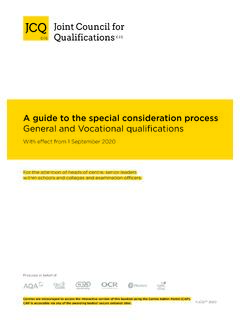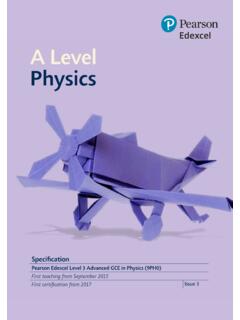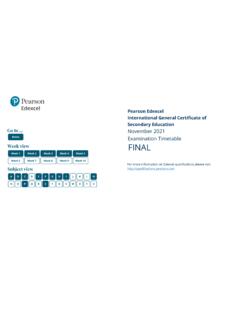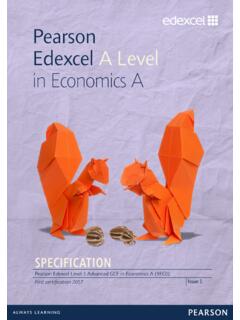Transcription of General Regulations for Approved Centres
1 Produced on behalf of:For the attention of heads of centre, senior leaders within schools and colleges and examination officers. JCQCIC 2021 General Regulations for Approved Centres1 September 2021 to 31 August 2022iFirst published in 2021 by Joint Council for QualificationsCIC Email: in pdf format from: are encouraged to access the interactive version of this document using the Centre Admin Portal (CAP). CAP is accessible via any of the awarding bodies secure extranet About these Regulations ..1 2 Who must read these Regulations ? ..3 3 The agreement between Centres and awarding bodies ..4 Prospective Centres ..4 Centre status ..4 Confidentiality ..5 Retention of candidates work ..6 Communication ..6 4 The responsibilities of awarding bodies ..7 Administrative support for Centres ..7 Reporting results ..7 Feedback to Centres ..8 Subject-specific support for Centres ..8 5 The responsibilities of Centres ..9 Centre management ..9 Access arrangements and reasonable adjustments.
2 11 Entries ..13 Centre assessed work ..14 Candidate information ..14 Conducting examinations and assessments ..15 Malpractice ..15 Results ..16 Post-results services and Certificates ..16 6 Personal data, freedom of information and copyright ..18 Personal data ..18 Freedom of information ..19 Copyright ..19 7 Contacts ..2111 About these These Regulations have been produced to ensure that the integrity and security of the examination /assessment system is always maintained and is not brought into disrepute. The Regulations adhere to the requirements of the qualification regulators in England, Wales, Northern Ireland and Scotland. Centres should note that any reference to JCQ or Joint Council for Qualifications within this booklet should be read as JCQCIC or the Joint Council for QualificationsCIC. Heads of centre, members of senior leadership teams and exam office personnel must familiarise themselves with the entire contents of this booklet. Changes made to the contents of this booklet since the previous version (1 September 2020 to 31 August 2021) are highlighted for easy identification.
3 The General Regulations cover: a) the agreement between Centres and awarding bodies (Section 3); b) the responsibilities of awarding bodies in providing administrative, subject- specific assessment and quality assurance support for Centres (Section 4); c) the responsibilities of Centres during preparations for examinations/assessments and post- examination /assessment activities (Section 5); d) obligations arising from current data protection, equality and freedom of information legislation. ( Centres should not just rely on the General Regulations to ensure compliance with the legislation.) (Section 6). A centre will have confirmed its readiness to adhere to these Regulations when first Approved as a centre (see paragraphs ). These Regulations apply to the following qualifications and may also apply to other qualifications as specified by an awarding body: AEA AQA Applied General qualifications AQA Level 1, Level 2 and Level 3 Technical qualifications BTEC qualifications (BTEC Firsts, BTEC Level 2 Technicals, BTEC Nationals, BTEC Tech Awards) Cambridge Nationals Cambridge Technicals CCEA Level 1 and Level 2 General qualifications CCEA Level 3 Awards Edexcel Awards Edexcel International GCSE ELC FSMQ GCE GCSE OCR Level 3 Certificates Projects (including the Extended Project) T-levels WJEC Level 1 and Level 2 General qualifications WJEC Level 1 and Level 2 Vocational Awards and Certificates WJEC Level 3 Applied Certificates, Diplomas and Extended Centres must conduct examinations and assessments in accordance with the General Regulations and, where relevant, the following JCQ publications: a) A guide to the special consideration process.
4 B) Access Arrangements and Reasonable Adjustments; c) Instructions for conducting coursework; d) Instructions for conducting examinations; e) Instructions for conducting non- examination assessments; and f) Suspected Malpractice Policies and documents may be supplemented from time to time by separate subject-specific instructions from the awarding bodies. For the purposes of this booklet, an examination or assessment centre (the centre) is Approved by one or more of the awarding bodies for the delivery of their qualifications. Prospective new Centres should refer to paragraph All heads of Centres will be required to confirm, on an annual basis, that they are both aware of and adhering to the latest version of these Regulations . This confirmation is managed as part of the National Centre Number Register (NCNR) annual update (see paragraph ). A head of centre must not delegate this responsibility to a member of the senior leadership team or the examinations to respond to the NCNR annual update, and/or the head of centre s declaration, will result in: your centre status being suspended; your centre not being able to submit examination entries; and not receiving or being able to access question , awarding bodies could withdraw their approval of your Who must read these Regulations ?
5 These Regulations apply to Centres that have been Approved by at least one of the JCQ awarding bodies and are taking any of the qualifications as defined in paragraph Prospective Centres must familiarise themselves with this document. They must be read, and referred to, by: a) the head of centre; b) members of the senior leadership team; c) the examinations officer. The head of centre is the individual who is accountable to the awarding bodies for ensuring that the centre is always compliant with the published JCQ Regulations and awarding body requirements to ensure the security and integrity of the examinations/assessments. The examinations officer is the person appointed by the head of centre to act on behalf of, and be the main point of contact for, the centre in matters relating to the General administration of awarding body examinations and assessments. The head of centre may not appoint themselves as the examinations officer. A head of centre and an examinations officer are two distinct and separate roles.
6 43 The agreement between Centres and awarding The approval of a centre by an awarding body signals the start of a contractual relationship which is governed by the contract between the awarding body and the centre, these Regulations and any other documents published by the JCQ, the awarding bodies or the regulators. Approval with one awarding body does not imply, and will not necessarily lead to, approval with another. Approved Centres must be able to meet the conditions set out in these Regulations and any specific qualification criteria. Where a centre uses a third party to deliver any part of a qualification, it must maintain oversight of, and responsibility for, the delivery of the qualification in accordance with these Regulations and awarding body requirements. Centres must have in place a written agreement with the third party and must ensure that a copy of the written agreement is available for inspection if requested by the awarding Prospective Centres must contact each awarding body whose qualifications they wish to offer in order to gain centre approval.
7 Details of an awarding body s centre approval process will be found on their website. Approval must be in place before delivering a qualification. As a minimum, approval must be finalised no later than five months before the closing date for candidate entries. Until approval has been granted, the centre cannot be given access to awarding body s assessment and support material. A checklist for prospective Centres can be found on the JCQ website: As part of the centre approval process, an awarding body may, where appropriate, undertake a credit check of the prospective centre. Once a centre has been Approved it will be subject to a probationary period of two years. The centre will receive a variety of centre inspections If a centre does not meet the requirements during the two-year probationary period, then their centre approval will be reviewed by the awarding bodies who will take appropriate action to secure compliance, including where necessary applying sanctions or removing approval.
8 Centre A centre must have: a) clear signage outside the main building; b) a reception where appropriate staff are available Monday to Friday between am to pm during term time; c) designated members of centre staff, available Monday to Friday, am to pm, to receive deliveries of confidential examination /assessment material and/or accompany a JCQ Centre Inspector or awarding body representative. AQA, CCEA, OCR, Pearson and WJEC will reject any application for centre recognition where it is intended to operate a centre from a private residential address; d) a secure storage facility in a room solely assigned to examinations as described in section 3 of the JCQ publication Instructions for conducting examinations; e) appropriate accommodation to support the size of the cohorts being taught, including appropriate accommodation for candidates requiring access arrangements. It is not permissible for a centre to be Approved purely for administrative purposes in order to take question papers to an alternative site.
9 Centres are only permitted to take question papers to an alternative site where the published criteria for an alternative site arrangement has been met. The JCQ Centre Inspection Service must be informed using the JCQ Alternative Site form: An awarding body reserves the right to withdraw approval either for the delivery of a specific qualification or centre approval for all qualifications at any time, if the centre has not complied with any part of the awarding body s requirements which are in force at the time. An awarding body additionally reserves the right to withdraw centre approval where continued approval would bring the examination /assessment system into disrepute. The awarding body reserves the right to notify the other JCQ awarding bodies of such actions. The awarding bodies reserve the right to withdraw approval of those Centres which do not meet the awarding body s current approval criteria, fail to address issues raised during an inspection or who fail to respond to the National Centre Number Register annual update.
10 The awarding bodies will review the approval of Centres who have not submitted candidate entries for two consecutive years. In the event of a centre ceasing to operate it must take all reasonable steps to protect the interests of the candidates. It must also notify each of the awarding bodies it is Approved by at the earliest opportunity. The awarding body will take all reasonable steps to protect the interests of the candidates. Centre approval does not automatically allow a centre to state or imply awarding body approval in published material or online. Permission must be sought from the relevant awarding body/bodies. This also extends to the use of an awarding body s logo. The centre will: a) keep confidential the names and addresses of examiners, moderators, external verifiers and any other awarding body examining/assessment personnel. This also extends to e-mail addresses of awarding body/JCQ personnel; b) not forward e-mails and letters from awarding body or JCQ personnel without prior consent to third parties or upload such correspondence onto social media sites and applications (including third party applications) such as Facebook, Twitter, Snapchat, LinkedIn etc; c) keep confidential the centre s employment of, in any capacity, any current or former JCQ Centre Inspectors, awarding body examiners, moderators, awarders, external verifiers or other examining personnel, and not mention them in any form of literature issued in connection with the centre s programmes of assessment.
